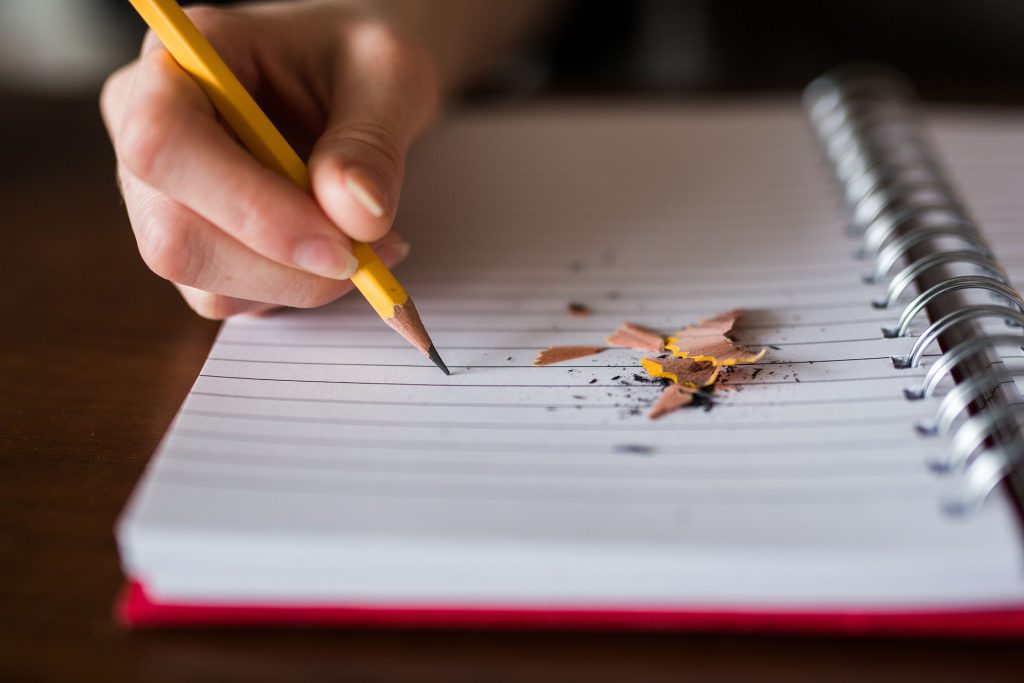What should you be writing every day if you are a writer? This is something you may ask yourself now and then…
There are various thoughts on this, but the same things do tend to come up again and again.
Which are:
- Morning Pages/ or Freewriting
- Your Work in Progress (WIP)
- Your Personal Journal
- Your Writer’s Notebook
- Possibly a Second Work in Progress, such as a short story.
I believe you should also be completing particular writing exercises either daily or weekly, depending on your schedule. This is especially helpfully in further developing your writing craft and skills.
It is also fun to now and then to try out different styles and forms, styles which you would not normally write. This will help to expand your skills and your creativity, and keep your brain actively learning, thinking and processing.
Morning Pages or Freewriting
I have mentioned Morning Pages and Freewriting in a couple of other posts, and they are very similar. They are both a way of doing a brain dump at the start of each writing practice, and it can really help your overall practice.
Morning Pages is one of the highly recommended practices by Julia Cameron in her book The Artist’s Way. It consists of writing 3 pages when you wake up, or when start your morning practice, and helps to clear your mind, unlock and unleash your creativity and also highlight any themes, values, or topics which are important to you. You will find common themes cropping up over time again and again, which might be worth exploring in your creative writing work or your artwork.
Freewriting is similar; but is a more focused type of Morning Pages, which I particularly favour. Some days I will start from nothing, and write ‘morning pages’, and other days, I will choose a topic, keywords, or an image and freewrite, or brain dump from that. I usually find the start of a new story, be it a short story or for a longer piece of work in this manner, almost every day. For me, it is a very productive practice; the best way to find new ideas and story seeds.

Your Work in Progress
The most important piece of writing you should try to complete every day is Your Current Work in Progress, or WIP.
I recommend, at the minimum, completing at least 300 words per day, every day of the year on your main project.
If you are writing a novel, this will equal:
- 2,100 words per week
- 8,400 words per month
- and 100,800 words per year
Therefore, even if you can only find 10 or so minutes a day and write 300 words on your novel, after one year, you will have a 100,000-word draft in your hands.
So never think you don’t have enough time, or can’t-do it. Just start today, 300 words at a time.
If you need more help developing your daily writing habit, check out my article here.
If you work on projects other than novels, then think about these numbers:
300 words a day is equal to:
- One Short Story per week (2000 word short story)
- 52 Short Stories per year (2000 word short stories)
- One long Short Story per month (8,000 words)
- 12 Short Stories per year (8,000 word short stories)
- One Novella (of 20k-40k words) every 2 to 4 months
It really doesn’t seem so daunting when you look at the numbers like this…
Start Today – Write 300 words each day. In a year, you will have your novel or short story collection!

I source my inspiration for the 300 words a day method to a content writer’s article I found at Wealthy Affiliate, a website designed to help you build and grow your online business. But since reading this article, I’ve found further references to 10-minute or 15-minute blocks of writing, which basically say the same thing. One is Write a Novel in Ten Minutes A Day by Katharine Grubb.
Your Personal Journal
Keeping a personal journal is also a great thing to consider, especially if you have the time and inclination.
Use it to delve into the issues that bother you on a daily basis; explore your relationships, examine your children and their behaviour; make notes and observations on yourself and your own character.
Keeping a personal journal is a type of therapy in itself, and is great for digging deep into your own values. Similar to Morning Pages, when you read back through it later, you will be surprised by reoccurring themes, themes which you might want to further explore in your creative writing.
Practice Note:
I often keep a journal, or cheap spiral notebook open next to my writing notebook or computer. Whenever I’m writing on my WIP and I start to meander in my own thoughts, start doubting myself, or just think about other things, I can quickly swap to my journal notebook and write those thoughts there, keeping them separate from my writing. This will also help train your mind to focus on your writing during ‘writing time’.
Your Writing or Writer’s Notebook
An important tool and resource which you should update regularly is your Writer’s Notebook. Now, this ‘notebook’ may come in various forms, from a Word document, to a file in Scrivner, or a folder in Google Drive, or my favourite, a plain old trusty ring bound notebook.
Your Writer’s Notebook, is a place to record ideas and fragments which come to you, images, notes, character impressions, interesting conversations overheard, and the numerous story ideas which hopefully come to you through your day.
Practice Note:
This is another notebook, which I keep nearby to my writing area, in which I jot down new ideas for story’s and characters as they come to me. I quickly write them down and then keep writing on my current story, in order not to get distracted, and also not to lose the new ideas.
Complete your writing exercises in your writer’s notebook too, another form of daily or weekly writing which I deem to be extremely important and valuable to any writer’s growth.

A Second Work in Progess, such as a short story
If you have time, I would recommend having a second work in progress on the go as well as your main WIP. This gives you something else to fall back on, especially if you happen to be having a little bit of a writer’s block one day, or are starting to feel bored with your main project. I find that I need the variety anyway. For me, it’s hard to focus only on one story at a time. it’s fun to have a few projects on the go, then you can bounce around a little.
I find I need the variety anyway. For me, it’s hard to focus only on one story at a time. it’s fun to have a few projects on the go, then you can bounce around a little.
Recommendation:
- that if you’re a writing a novel, to complete another daily 300 words writing session and write short stories.
- If you write short fiction, then write another 300 words each day, and try your hand at something longer, or shorter; a novella, or flash fiction, or maybe take those 10 to 15 minutes and write poetry.
- Another way to go is to alter your genre, and write something completely different,
With all these methods, make it fun! Let your inner child you come out and play, write a fun story with her or him.
If you can find another writing slot time, and complete this additional 300 words per day, this will equal to a huge growth in your total yearly word count and growth as a writer. After a year, you will have finished your novel first draft, and a number of short stories.
Just Write 300 Words a Day
If you get nothing more out of this article, by just doing the above, will get your novel or short stories written.
Isn’t that what’s most important?
Anything else, the personal journal, the freewriting, the extra projects, they are all extras and are a bonus, and are more to jump start your work in progress and help beat writer’s block, than anything else.
I hope you found this post informative and motivating. If you have any questions or thoughts, please do not hesitate to leave me a comment below, and I will reply as soon as I can.
Happy Writing…. Remember….All you need is 300 words a day!
Erica

Leave a Reply